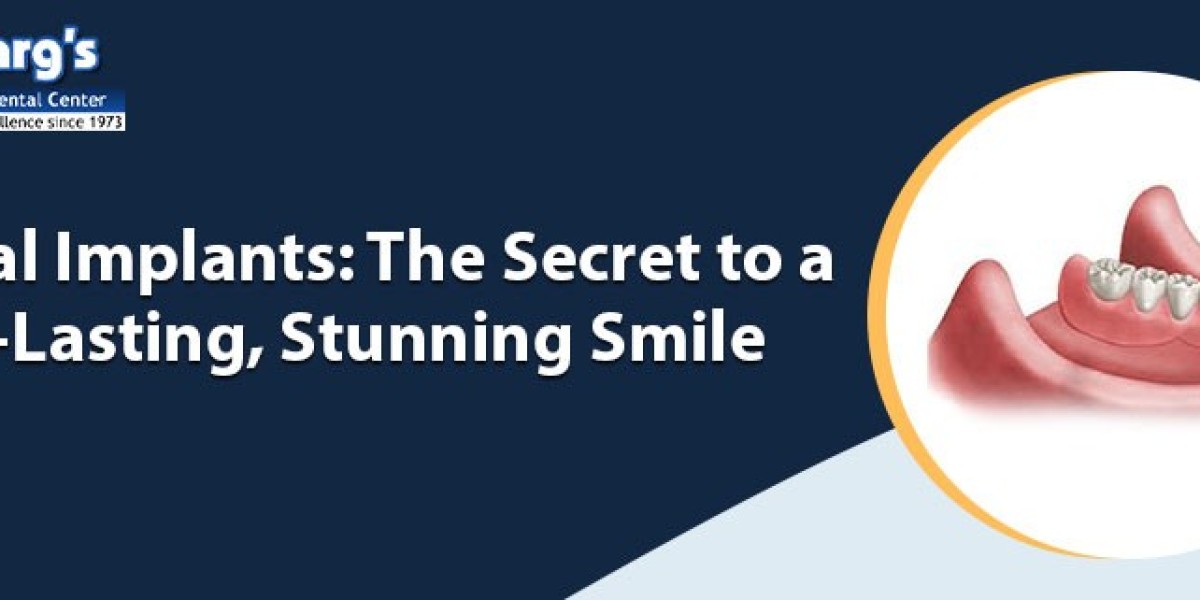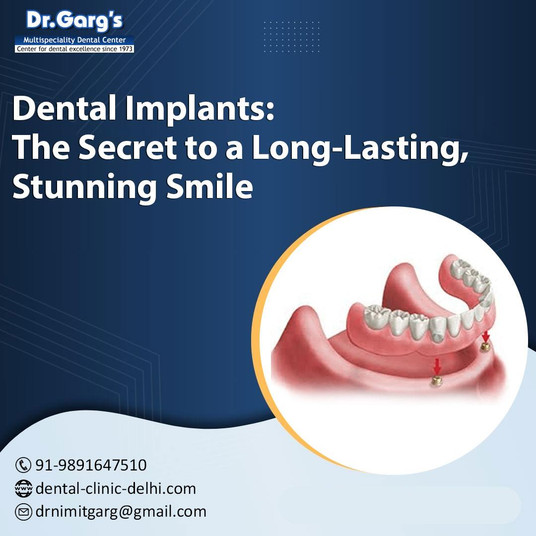Dental implants have become one of the most sought-after solutions for people dealing with missing or damaged teeth. With advancements in dental technology, dental implants are now more accessible, efficient, and long-lasting than ever before. In this article, we’ll explore what dental implants are, how they work, their benefits, and why they could be the ideal solution for restoring your smile.
What Are Dental Implants?
A dental implant is a medical device that is surgically placed into the jawbone to replace a missing tooth. Unlike traditional dentures or bridges, dental implants are permanent and are designed to function just like natural teeth. The implant itself is a titanium post that acts as the tooth root, and a crown (or artificial tooth) is attached to it, creating a complete replacement.
How Do Dental Implants Work?
Dental implants work by integrating with the jawbone in a process known as osseointegration. Once the implant is placed into the bone, it fuses securely with the surrounding bone tissue. This ensures the implant is stable, and it mimics the role of a natural tooth root. Once the integration is complete, a custom-designed crown is attached to the implant, completing the restoration.
The Process of Getting Dental Implants:
The journey to getting dental implants is typically completed in several stages. Here’s an overview of the process:
- Initial Consultation: Your first visit will involve a thorough dental examination, including X-rays or 3D imaging, to assess the health of your gums and jawbone. During this visit, your dentist will discuss your medical history, treatment options, and the best plan for your needs.
- Implant Placement: The next step is the placement of the dental implant. The procedure is performed under local anesthesia to ensure comfort. The titanium post is surgically inserted into the jawbone, and the gums are closed over it.
- Healing Period: After the implant is placed, it needs time to heal. This healing period can take anywhere from 3 to 6 months, depending on the individual’s healing process. During this time, the implant fuses with the jawbone, ensuring stability.
- Abutment Placement: Once the implant has integrated with the bone, an abutment is placed on top. The abutment connects the implant post to the custom crown. At this point, your dentist will take impressions of your mouth to create a perfectly fitted crown.
- Crown Placement: Finally, the custom crown is placed on the abutment, completing the restoration. The crown will be designed to match the shape, color, and size of your natural teeth, ensuring a seamless appearance.
Benefits of Dental Implants:
Dental implants offer several advantages over traditional tooth replacement options like dentures or bridges. Here are just a few of the key benefits:
- Permanent Solution: Unlike dentures, which need to be removed and cleaned regularly, dental implants are permanent fixtures. Once placed, they can last a lifetime with proper care and maintenance.
- Natural Look and Feel: Implants are designed to look and feel just like your natural teeth. They restore full functionality, allowing you to eat, speak, and smile with confidence.
- Improved Oral Health: Dental implants help preserve the jawbone and prevent bone loss, which can occur when a tooth is lost. This helps maintain the structure of your face and prevents the sinking or sagging appearance often associated with missing teeth.
- Increased Comfort: Unlike dentures, which can slip or cause irritation, dental implants are secure and stable. This results in a more comfortable experience and better quality of life.
- Better Chewing and Speaking Ability: Implants restore the ability to chew food comfortably and speak clearly, unlike dentures that may move or cause discomfort.
Who Is a Candidate for Dental Implants?
Dental implants are suitable for most people who have lost teeth, but certain factors must be considered. Ideal candidates should have:
- Healthy gums and sufficient jawbone density. If the jawbone has receded due to tooth loss, bone grafting may be required before implant placement.
- Overall good oral health, free of gum disease or other issues that could affect healing.
- A commitment to maintaining good oral hygiene habits, as implants require proper care to ensure their longevity.
Your dentist will conduct a thorough evaluation to determine if dental implants are the right option for you.
Caring for Dental Implants
Taking care of your dental implants is essential to ensuring their longevity. Here are some key tips for maintaining your implants:
- Brush and Floss Regularly: Just like natural teeth, dental implants require daily brushing and flossing to prevent plaque buildup and maintain gum health.
- Routine Dental Check-ups: Visit your dentist regularly for check-ups and professional cleanings to ensure your implants and overall oral health remain in optimal condition.
- Avoid Hard Foods: Although implants are durable, avoid chewing on very hard foods or objects that could damage the crown or implant.
Is the Procedure Painful?
The dental implant procedure is typically done under local anesthesia, which numbs the area around the implant site. Most patients report minimal discomfort during the procedure, and any post-surgery discomfort can be managed with over-the-counter pain relievers. The recovery process is generally smooth, though some swelling or bruising may occur in the first few days.
Conclusion
Dental implants offer a life-changing solution for those dealing with tooth loss or damage. With their natural look, durability, and comfort, they are quickly becoming the preferred option for tooth replacement. If you’re interested in dental implants, consult Dr. Garg’s Multispeciality Dental Center to learn more about the benefits and determine if they are the right choice for you.
Source: https://justpaste.it/dental-clinic-Delhi










